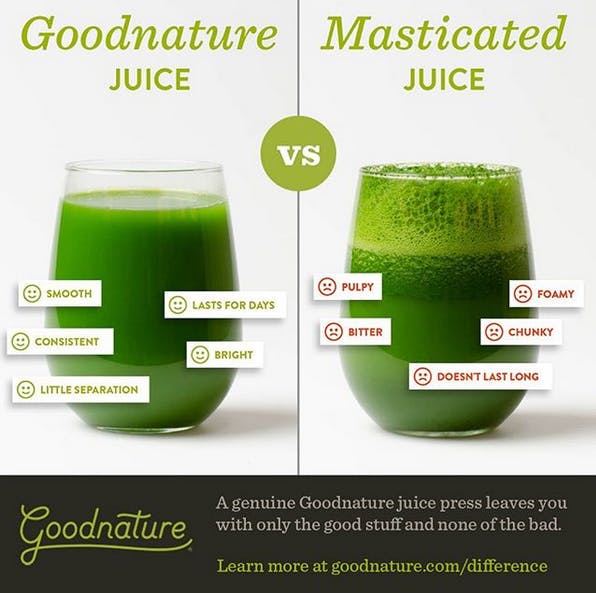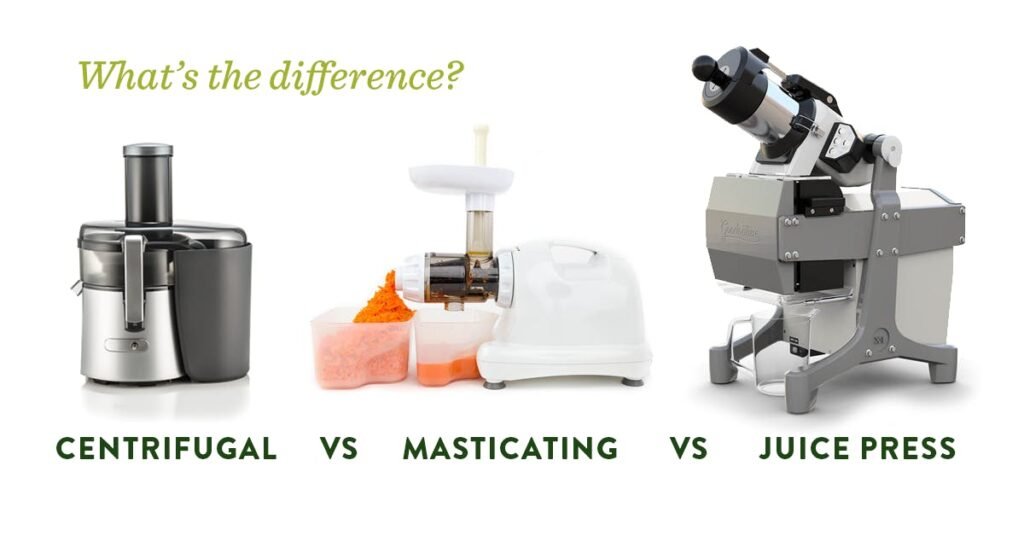Cold press juicers and masticating juicers are popular for health enthusiasts. Both extract juice differently, offering unique benefits.
Choosing the right juicer can be confusing. Cold press juicers use hydraulic pressure to extract juice, preserving nutrients. Masticating juicers, on the other hand, slowly crush fruits and vegetables, minimizing oxidation and maintaining flavor. Understanding the differences helps make an informed choice for your lifestyle.
This comparison will highlight the pros and cons of each type, assisting you in finding the best juicer for your needs. Whether you prioritize nutrient retention, ease of use, or cleaning, this guide will provide valuable insights to help you decide which juicer suits your preferences.

What Is A Cold Press Juicer?
You might have heard about cold press juicers and wondered what makes them different. If you’re looking to make healthier juice at home, understanding how a cold press juicer works is essential. Let’s dive into the details and see if this type of juicer suits your needs.
Mechanism And Functionality
A cold press juicer operates by crushing and pressing fruits and vegetables to extract juice. This method is known as slow juicing. It produces minimal heat and preserves the nutrients and enzymes in your juice.
You place your ingredients into a chute. The juicer then uses a slow auger to squeeze the produce. This process ensures that you get a higher yield of juice with more nutrients intact.
I remember the first time I used a cold press juicer. The juice tasted incredibly fresh and vibrant, unlike anything I had tried before. It was like drinking liquid sunshine.
Pros And Cons
Pros:
- Retains more nutrients and enzymes due to less heat production.
- Produces a higher yield of juice.
- Juice stays fresh longer—up to 72 hours in the fridge.
Cons:
- Slower process compared to centrifugal juicers.
- Typically more expensive.
- Can be more time-consuming to clean.
Have you ever tried a juice that tasted flat within hours? That’s less likely with cold press juicers. They’re designed to keep your juice fresh and nutrient-rich for longer periods.
So, what do you think? Is a cold press juicer the right choice for your kitchen? If you prioritize nutrient retention and juice quality, it might be worth the investment.
What Is A Masticating Juicer?
What is a Masticating Juicer?
A masticating juicer, often called a slow juicer, is designed to extract juice from fruits and vegetables using a slow, grinding process. This method preserves more nutrients and enzymes compared to other juicers, making it a popular choice for health enthusiasts. If you’re looking to get the most out of your produce, understanding how this juicer works can be a game-changer.
Working Principle
The masticating juicer operates by crushing the produce between a slow-moving auger and a mesh screen. This process mimics chewing, hence the name “masticating.” The slow speed reduces heat and oxidation, preserving the natural flavors and nutrients. You can imagine it as a gentle way to squeeze out every drop of goodness from your fruits and veggies.
Advantages And Disadvantages
Advantages:
- Higher Nutrient Retention: The slow process keeps more vitamins and minerals intact.
- Better Juice Yield: You get more juice from the same amount of produce.
- Versatility: It can handle leafy greens, wheatgrass, and even nuts for nut milk.
Disadvantages:
- Longer Juicing Time: It takes more time to produce juice compared to faster juicers.
- Higher Price: Masticating juicers are generally more expensive.
- More Cleaning: The various parts require thorough cleaning after each use.
Have you ever wondered why some juices taste fresher than others? With a masticating juicer, you’ll notice the difference in flavor and nutrient content. But, is the extra effort worth it for you?
If you’re serious about your health and willing to invest a bit more time and money, a masticating juicer might be your perfect kitchen companion. What do you think? Is preserving those precious nutrients worth the slower pace?
Nutrient Retention
Juicing has become a popular way to consume fruits and vegetables. People often debate the best juicer type for nutrient retention. Cold press juicers and masticating juicers both claim to preserve nutrients. Let’s see how each one performs.
Vitamin And Mineral Preservation
Cold press juicers use slow, gentle pressing to extract juice. This method keeps vitamins and minerals intact. The process generates minimal heat. Heat can destroy nutrients. So, cold press juicers help retain more vitamins and minerals.
Masticating juicers also operate at low speeds. They crush and grind fruits and vegetables. This method also preserves nutrients. Masticating juicers generate less heat than centrifugal juicers. This helps keep vitamins and minerals in the juice.
Impact On Juice Quality
Cold press juicers produce juice with a rich, full-bodied taste. The juice is less frothy and has a smooth texture. The nutrients remain preserved, enhancing the juice quality. The juice can be stored longer without losing nutritional value.
Masticating juicers create high-quality juice too. The juice has a similar rich taste and smooth texture. Masticating juicers extract more juice from the produce. This results in less waste and more nutrient-dense juice.

Juice Yield
Cold press juicers often extract more juice with minimal oxidation, preserving nutrients. Masticating juicers also yield high juice amounts, focusing on nutrient retention.
Juice yield is crucial when choosing a juicer. It determines the amount of juice extracted from fruits and vegetables. Two popular types are cold press juicers and masticating juicers. Both promise high juice yields but operate differently. Let’s explore their efficiency in juice extraction and the comparison of waste.Efficiency In Juice Extraction
Cold press juicers use hydraulic power to press fruits and vegetables. This method extracts juice slowly, preserving nutrients and flavor. The process ensures a high yield, often more than other juicers. Masticating juicers use a slow, grinding motion to crush produce. This method extracts juice efficiently, retaining nutrients and enzymes. Masticating juicers are known for their ability to juice leafy greens and wheatgrass well.Comparison Of Waste
Cold press juicers produce very dry pulp. Less moisture in the pulp indicates more juice extracted. Users often notice minimal waste with these juicers. Masticating juicers also produce dry pulp but may vary based on the produce used. Generally, masticating juicers leave little waste, ensuring maximum juice extraction. Both types aim to reduce waste and maximize juice yield, but individual results may differ.Ease Of Use
When choosing a juicer, ease of use is crucial. This includes the setup, operation, and cleaning process. Both cold press and masticating juicers have their pros and cons. Let’s explore these in detail.
Setup And Operation
Cold press juicers often have fewer parts. This makes the setup straightforward. You simply assemble the pieces, and you are good to go. The operation involves placing fruits or vegetables in the chute. The juicer then does its job quietly and efficiently.
Masticating juicers, on the other hand, can be a bit more complex. They may have more parts, which can make assembly tricky. The operation is similar but sometimes slower. You need to cut produce into smaller pieces to fit into the chute.
Cleaning And Maintenance
Cleaning a cold press juicer is usually easier. With fewer parts, you spend less time disassembling and washing. Most parts are dishwasher safe. This saves time and effort.
Masticating juicers can be more time-consuming to clean. They have more parts to disassemble and wash. Some parts may not be dishwasher safe, requiring hand washing. Regular maintenance keeps the juicer in good condition.

Noise Levels
When choosing between a cold press juicer and a masticating juicer, noise levels play a significant role. Both types of juicers operate differently, which affects the sound they produce. Let’s explore how each type fares in terms of noise.
Operation Sound Comparison
Cold press juicers are known for their quiet operation. They use a slow, grinding process to extract juice. This method creates minimal noise. On the other hand, masticating juicers also operate quietly. They chew and crush fruits and vegetables. This action produces a soft hum, rather than a loud noise.
Both juicers are much quieter than traditional centrifugal juicers. These traditional juicers spin at high speeds, creating a lot of noise. So, if you value a quiet kitchen, cold press and masticating juicers are excellent choices.
Impact On Home Environment
A quiet juicer can make your mornings more peaceful. You won’t wake up family members with loud noises. Cold press and masticating juicers are ideal for early risers.
Additionally, these juicers create a calm atmosphere. You can enjoy your morning routine without the stress of loud appliances. Quiet juicers allow you to prepare fresh juice without disturbing the tranquility of your home.
Both cold press and masticating juicers offer a quieter, more serene juicing experience. This makes them perfect for those who prioritize a peaceful home environment.
Cost And Value
When choosing a juicer, cost and value are important factors. Both cold press and masticating juicers have their own price points and benefits. Knowing what you’re getting into helps in making an informed decision.
Initial Investment
Cold press juicers tend to be more expensive upfront. They often range from $150 to $500. These juicers promise higher juice yield and better quality.
Masticating juicers usually fall within the same price range. Though some high-end models can cost more. The initial investment might seem high, but the benefits are long-term.
Long-term Value
Cold press juicers offer great long-term value. They preserve more nutrients and enzymes. This means healthier juice over time.
Masticating juicers also provide excellent long-term value. They are known for their durability. These juicers can last for many years with proper care.
Both types of juicers help save money in the long run. Fresh, homemade juice is often cheaper than store-bought juice. Plus, the health benefits are invaluable.
Frequently Asked Questions
Which Is Better Cold-pressed Or Masticating Juicer?
Masticating juicers are better for preserving nutrients and yield more juice. Cold-pressed juicers are also effective but slower.
What Are The Disadvantages Of A Masticating Juicer?
Masticating juicers can be expensive and often have a slower juicing process. They require more prep time and cleaning.
What Are The Disadvantages Of A Cold Press Juicer?
Cold press juicers are expensive and take longer to juice. Cleaning them is often time-consuming and tedious.
Is A Cold Press Juicer Better Than A Juicer?
Yes, a cold press juicer is often better. It preserves more nutrients, produces less heat, and yields more juice.
Conclusion
Choosing between a cold press juicer and a masticating juicer depends on your needs. Cold press juicers preserve nutrients well. Masticating juicers excel at juicing leafy greens. Both offer healthy juice options. Consider your budget and preferences. Think about the types of fruits and vegetables you juice most.
Each has unique benefits. Your choice will impact your juicing experience. Happy juicing!


